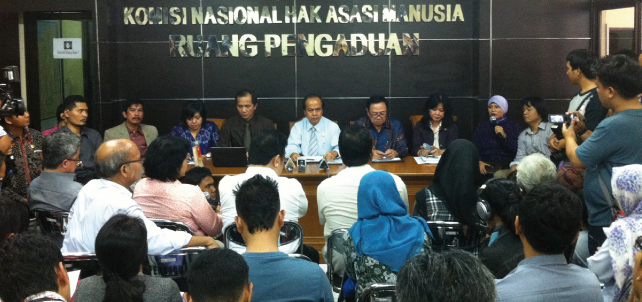When the Suharto regime was toppled by the student movement and the effects of the 1997 Asian economic crisis, Indonesia entered an era of democratic transition, known as the Reformation (reformasi). The transition has not always gone smoothly and former rulers from the so-called New Order regime under Suharto, many of whom were responsible for gross human rights violations, remain influential actors in Indonesia’s political landscape. Some have formed political parties to compete in legislative and presidential elections. This year, just 16 years after the fall of the New Order regime, the election polls show that the old regime is ready to return to power.
The Great Indonesia Movement (Gerindra) Party of retired army General Prabowo Subianto became the country’s third biggest party in this year’s legislative elections. Prabowo was involved in numerous human rights violations, including the kidnapping of activists in 1998. To date, the whereabouts of some of those kidnapped remain unknown. Gerindra has partnered up with the Golkar Party, the ruling party during the New Order regime and now the second biggest. The coalition has expressed its support for anti-democratic and fundamentalist groups, such as the Indonesian Anti-Communist Front (FAKI), the Islamic Defenders Front (FPI) and various other vigilante organizations and militias, who in turn have pledged to back the coalition. Gerindra’s party manifesto includes religious purification, towards a “pure Sunni Islam”, aimed at minority groups, especially Shiite and Ahmadi Muslims. It seems that the publication of this manifesto has resulted in a number of incidents of intimidation and hate speech towards religious minorities, including Shiite Muslims and Christians, in areas such as Aceh and West and East Java.
The Indonesian Democratic Party of Struggle (PDIP), former opposition Party and currently the biggest party in the country, has put forward a civilian Presidential candidate, now Governor of Jakarta, Joko Widodo -often abbreviated as Jokowi. Jokowi’s active support for diversity, clean government and human rights has earned him support of large parts of civil society and media organizations
This July 2014 Presidential election may well turn out to be crucial in determining the future of human rights and the conditions for human rights defenders in Indonesia in the decades to come. The public discourse has narrowed down to dichotomies: pro versus anti-human rights, pro versus anti-militarism, pro versus anti-religious purification, and ultimately pro versus anti-old regime, and its authoritarianism and human rights violations.
Through its Protection Desk Indonesia, PI works with some of the minority groups at risk. These communities, and many Indonesian HRDs with them, consider Prabowo’s potential Presidency as a real threat, including to the right to freedom of religion or belief. A researcher from the Indonesian Institute of Sciences (LIPI) recently stated that if Prabowo comes to power “the State will be more and more involved in determining whether someone’s faith or the religious group he belongs is the right one or heretic in Indonesia”. Indonesian human rights defenders fear that if the old legacy returns to power, they will be facing up to a climate of injustice again, with both the state and dominant groups of society putting pressure on the space to defend human rights and fundamental freedoms.
After a former military man under Suharto, and now spokesperson for Prabowo, recently acknowledged on TV that he knows the exact fate of those kidnapped and disappeared in 1998, civil society organizations met the National Human Rights Commission on 7 May 2014 urging them to follow up investigations into these cases.


